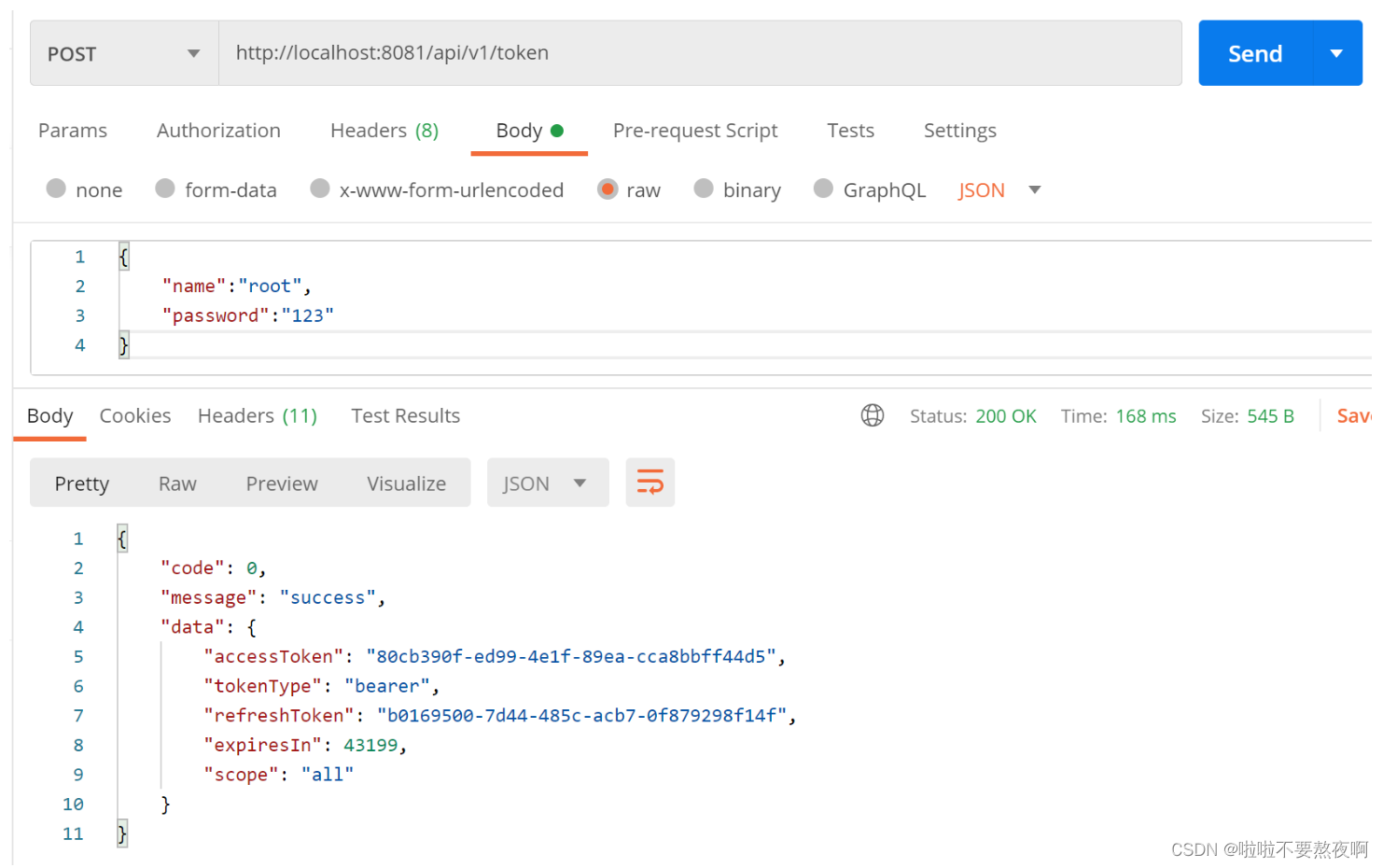文章目录
- 1. 搭建资源服务器
- 1. 密码加密配置类 PasswordEncodeConfig
- 2. Token存储配置类 TokenStoreAutoConfiguration
- 3. 资源服务器配置类 ResourceServerAutoConfiguration
- 4. META-INF/spring.factories 文件中添加自动配置类
- 2. 搭建认证服务器
- 1. 安全配置类 WebSecurityConfig
- 2. 授权服务器配置类 AuthorizationServerConfiguration
- 3. Rest调用配置类 RestTemplateConfig
- 4. 认证登录并获取access_token
- 5. 启动项目测试
1. 搭建资源服务器
搭建资源服务器和授权服务器我前面文章已经讲过,资源服务器是一个starter,这里就不重复了。
1. 密码加密配置类 PasswordEncodeConfig
@Configuration
public class PasswordEncodeConfig {
@Bean
public PasswordEncoder passwordEncoder() {
return new BCryptPasswordEncoder();
}
}
2. Token存储配置类 TokenStoreAutoConfiguration
@Configuration
public class TokenStoreAutoConfiguration {
@Autowired
private RedisConnectionFactory connectionFactory;
/**
* 初始化 RedisTokenStore 用于将 token 存储至 Redis
*/
@Bean
public RedisTokenStore redisTokenStore() {
RedisTokenStore redisTokenStore = new RedisTokenStore(connectionFactory);
// 设置key的层级前缀,方便查询
redisTokenStore.setPrefix("TOKEN:");
return redisTokenStore;
}
}
3. 资源服务器配置类 ResourceServerAutoConfiguration
@Slf4j
@Configuration
@EnableResourceServer
@EnableGlobalMethodSecurity(prePostEnabled = true)
public class ResourceServerAutoConfiguration extends ResourceServerConfigurerAdapter {
@Autowired
private TokenStore tokenStore;
@Value("${spring.application.name}")
private String appName;
@Override
public void configure(ResourceServerSecurityConfigurer resources) {
resources.resourceId(appName);
resources.tokenStore(tokenStore);
}
}
4. META-INF/spring.factories 文件中添加自动配置类
# Auto Configure
org.springframework.boot.autoconfigure.EnableAutoConfiguration=
com.hh.config.ResourceServerAutoConfiguration,
com.hh.config.TokenStoreAutoConfiguration
2. 搭建认证服务器
1. 安全配置类 WebSecurityConfig
这里数据源是存储在内存中的,所以通过里配置的用户名和密码来获取token:
/**
* - @EnableGlobalMethodSecurity:该注解是用来开启权限注解
* - prePostEnabled = true:开启Spring Security提供的四个权限注解,@PostAuthorize、@PostFilter、@PreAuthorize 以及@PreFilter
*/
@Configuration
@EnableGlobalMethodSecurity(prePostEnabled = true)
@EnableWebSecurity
public class WebSecurityConfig extends WebSecurityConfigurerAdapter {
@Autowired
private PasswordEncoder passwordEncoder;
@Override
@Bean
public UserDetailsService userDetailsService() {
// 内存数据库:用户名root,密码123
InMemoryUserDetailsManager inMemoryUserDetailsManager = new InMemoryUserDetailsManager();
inMemoryUserDetailsManager.createUser(User
.withUsername("root")
.password(passwordEncoder.encode("123"))
.roles("ADMIN").build());
return inMemoryUserDetailsManager;
}
//去除security的ROLE_前缀限制
@Bean
public RoleVoter roleVoter(){
RoleVoter roleVoter = new RoleVoter();
roleVoter.setRolePrefix("");
return roleVoter;
}
/**
* 放行和认证规则
*/
@Override
protected void configure(HttpSecurity http) throws Exception {
super.configure(http);
}
// 自定义AuthenticationManager:并没有在工厂中暴露出来
// 使用AuthenticationManagerBuilder来自定义AuthenticationManager,覆盖默认的AuthenticationManager
@Override
protected void configure(AuthenticationManagerBuilder auth) throws Exception {
auth.userDetailsService(userDetailsService());
}
// 开发者如需使用AuthenticationManager,
// 则可以通过覆盖此方法,将configure(AuthenticationManagerBuilder)方法构造的AuthenticationManager暴露为Bean。
@Bean
@Override
public AuthenticationManager authenticationManagerBean() throws Exception {
return super.authenticationManagerBean();
}
}
2. 授权服务器配置类 AuthorizationServerConfiguration
/**
* 配置授权服务器
*/
@Configuration
@EnableAuthorizationServer
public class AuthorizationServerConfiguration extends AuthorizationServerConfigurerAdapter {
@Autowired
private UserDetailsService userDetailsService;
@Autowired
private AuthenticationManager authenticationManager;
@Autowired
private PasswordEncoder passwordEncoder;
@Autowired
private TokenStore tokenStore;
/**
* 用来配置授权服务器可以为哪些客户端授权,使用哪种授权模式
*
* 密码模式:在密码模式中,用户向客户端提供用户名和密码,客户端通过用户名和密码到认证服务器获取令牌
* (A)用户访问客户端,提供URI连接包含用户名和密码信息给授权服务器
* (B)授权服务器对客户端进行身份验证
* (C)授权通过,返回access_token给客户端
*/
@Override
public void configure(ClientDetailsServiceConfigurer clients) throws Exception {
clients.inMemory()
// 客户端id
.withClient("client_id")
// 客户端秘钥
.secret(passwordEncoder.encode("client_secret"))
// 授权模式
.authorizedGrantTypes("password", "refresh_token", "client_credentials")
// access_token的过期时长
.accessTokenValiditySeconds(43200)
// refresh_token的过期时长
.refreshTokenValiditySeconds(86400)
// 允许授权的范围
.scopes("all");
}
/**
* 刷新令牌必须配置userDetailsService,用来刷新令牌时的认证
*/
@Override
public void configure(AuthorizationServerEndpointsConfigurer endpoints) {
// 配置token的存储方式
endpoints.tokenStore(tokenStore);
// 配置认证管理器
endpoints.authenticationManager(authenticationManager);
// 配置认证数据源,刷新令牌时的认证
endpoints.userDetailsService(userDetailsService);
}
/**
* 开启token检查接口
*/
@Override
public void configure(AuthorizationServerSecurityConfigurer security){
security.allowFormAuthenticationForClients().checkTokenAccess("permitAll()");
}
}
3. Rest调用配置类 RestTemplateConfig
@Configuration
public class RestTemplateConfig {
@Bean
public RestTemplate restTemplate() {
return new RestTemplate();
}
}
4. 认证登录并获取access_token
@Slf4j
@RestController
@RequestMapping("/api/v1")
public class OAuthController {
@Autowired
private LoginService loginService;
@PostMapping("/token")
public ApiResponse<AuthToken> oauth(@RequestBody @Valid LoginQo loginQo) {
AuthToken authToken = loginService.getAccessToken(loginQo);
return new ApiResponse<>(0,"success",authToken);
}
}
@Service
@Slf4j
public class LoginServiceImpl implements LoginService {
@Autowired
private RestTemplate restTemplate;
/**
* 通过登录信息获取令牌
* @param loginQo 登录信息
* @return 令牌
*/
@Override
public AuthToken getAccessToken(LoginQo loginQo) {
MultiValueMap<String, String> map = new LinkedMultiValueMap<>();
map.add("username", loginQo.getName());
map.add("password", loginQo.getPassword());
map.add("client_id", "client_id");
map.add("client_secret","client_secret");
map.add("grant_type", "password");
map.add("scope", "all");
// 这里会进行 Oauth2.0 的请求:http://127.0.0.1:8081/oauth/token
Map response = restTemplate.postForObject("http://127.0.0.1:8081/oauth/token", map, Map.class);
if (MapUtil.isEmpty(response)) {
return null;
}
// 封装返回
AuthToken authToken = new AuthToken();
authToken.setAccessToken((String) response.get("access_token"));
authToken.setExpiresIn((Integer) response.get("expires_in"));
authToken.setRefreshToken((String) response.get("refresh_token"));
authToken.setTokenType((String) response.get("token_type"));
authToken.setScope((String) response.get("scope"));
return authToken;
}
}
需要在资源服务器配置类中放行获取token的请求:
@Slf4j
@Configuration
@EnableResourceServer
@EnableGlobalMethodSecurity(prePostEnabled = true)
public class ResourceServerAutoConfiguration extends ResourceServerConfigurerAdapter {
@Autowired
private TokenStore tokenStore;
@Value("${spring.application.name}")
private String appName;
@Override
public void configure(ResourceServerSecurityConfigurer resources) {
resources.resourceId(appName);
resources.tokenStore(tokenStore);
}
@Override
public void configure(HttpSecurity http) throws Exception {
http.authorizeRequests()
// 放行获取token的请求
.antMatchers("/api/v1/token").permitAll()
// 其他请求必须认证才能访问
.anyRequest().authenticated()
.and()
.csrf().disable();
}
}
5. 启动项目测试

最后
以上就是大力世界最近收集整理的关于SpringSecurity Oauth2 - 03 内存数据源完成认证登录的全部内容,更多相关SpringSecurity内容请搜索靠谱客的其他文章。
本图文内容来源于网友提供,作为学习参考使用,或来自网络收集整理,版权属于原作者所有。








发表评论 取消回复